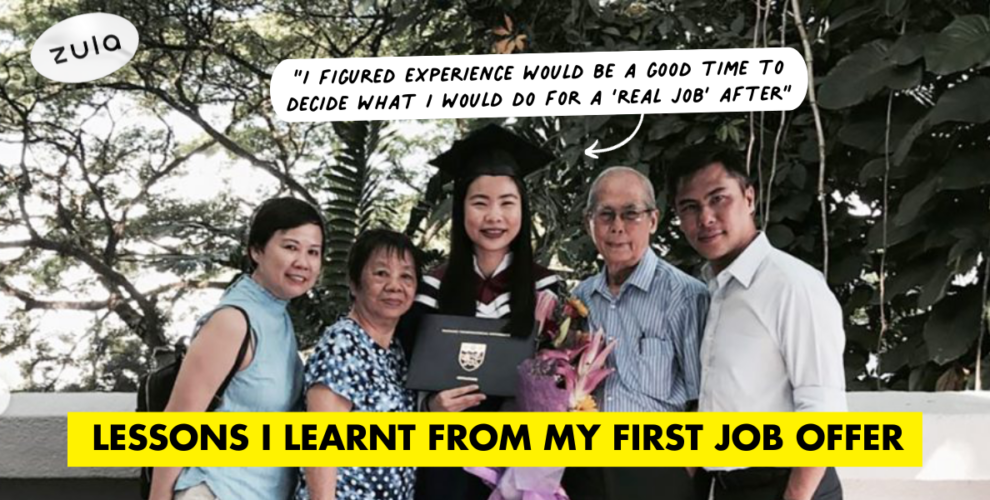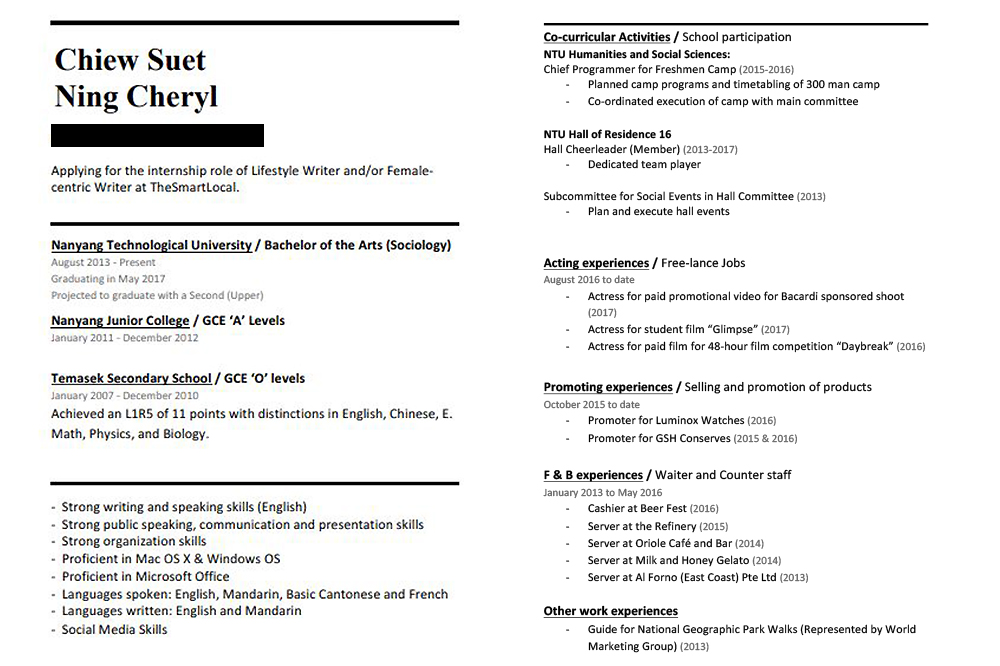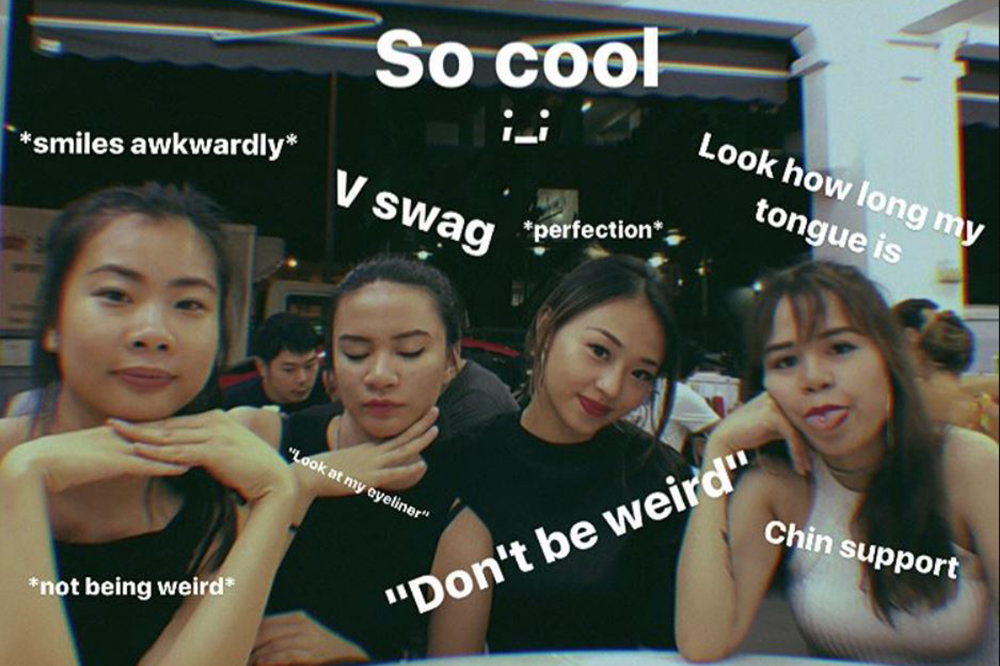Applying For Jobs in Singapore as a Fresh Grad
If life was a Pokemon game, a fresh grad would be the Magikarp of the working world. Without any relevant real-world industry knowledge, you’ll realise you’re as useful as the Splash attack.
That occurred to me in my second last week of university, when the realisation dawned on me that I had to apply for a job.
Not only was I unsure of where to look or apply for jobs, but I was also trapped in the ‘need job for experience, but need experience for job’ conundrum; almost no one wanted to hire a person with a S$30,000 piece of paper.
That’s why contrary to conventional advice to wait for your ‘dream job’, I took the first offer I got as a fresh grad. And these are the things I wish someone would have told me before I transitioned into the working world.
Contents
1. List your strengths
When you bullsh!t so hard and your resume still looks sad. *cries*
When I graduated in May 2017, I was a clueless graduate with neither ambition nor direction. So I figured I could start the job search by penning my strengths and what I liked. The list looked something like this:
My strengths:
1) a pretty intuitive understanding of grammar
2) good organisation skills
3) meticulous
4) pursuing things I took an interest in relentlessly and competently
I liked:
1) finishing things
I realised my Sociology degree didn’t dictate my options, and what I learnt in University wouldn’t wholly apply to most jobs. Instead, my chosen job should be one enjoyed every day.
After considering some options, I submitted my sparse resume twice—once for a government military intelligence officer position (because the starting pay was S$4,500) and another for a writing internship at TheSmartLocal.
I got rejected for both but ZULA’s editor offered me a writing internship and I took it.
2. Get the ball rolling with any job
Even though I was unsure about my future with ZULA, I figured the experience would be a good time to decide what I would do for a ‘real job’ after.
I remember steeling myself on the first day, “I’m going to give this internship my best and then f**k off after work. It’s a professional setting, not a support group where you sit in a circle and cry about your problems with your co-workers.”
And it helped because my first three months were exhausting; every night, I would pass out at 9.00pm like my grandma. From not knowing how to even crop photos on Photoshop, I learnt copywriting for digital media, editing, managing people, and interviewing people for stories.
It wasn’t as important that I had a job, but that I had started the ball rolling. In turn, it helped me realise what kind of job I would be interested in pursuing full-time.
Also read:
I Was Stuck In A Job I Hated And Here’s How I Made It Work To My Advantage
3. Adjust your pay expectations
It was on this day, I realised I had caught feelings for my job ;_;
Fresh grads tend to focus on whether a job offers a high salary or if the company they apply to is a brand name that would beef up their resume and impress their relatives during CNY.
They’d refer to the Graduate Employment Survey when quoting their ‘expected salaries’ and feel disappointed when they’re offered less. In reality, the stated median pay doesn’t apply across all industries.
Government jobs in the Public Administration and Defence sectors offer a starting pay of about S$3,500 to S$3,900 (from the estimates I got from my friends). In private sectors, such as in the media or advertising industry, you’re looking at a starting pay of around S$3,000 a month.
That’s why I wasn’t picky when I chose my first job; instead of focusing on the offered salary, I considered the skills I would pick up. The reality is most switch jobs and careers throughout their lives.
So achieving transferable tools like how to send emails to clients, on top of gaining some industry experience, is preferable.
4. Work reveals who you are
Trapped in my headspace doing a 9-to-6 job allowed me to realise my inner monologue was overly critical and harsh of myself. And that translated to unpleasant behaviours such as being impatient, tactless, and unable to accept failure.
Because most work environments have the motto “teamwork makes the dream work”, I had to work on being a less toxic person for myself and the people around me.
For instance, instead of displaying my annoyance at my interns or being short with colleagues, I worked on summoning the powers of the PR god to maintain a straight face and even voice. I even tried not to swear.
I began going to therapy to improve my mental health to complement my personal growth, and I learnt to be less selfish, angry, and depressed.
Working with a team improves how you respond to social situations and helps you understand workplace norms. And this is learnt through first-hand experience, regardless of company.
Working In Your First Job
Through the process of doing, I created the much-needed momentum for my unmotivated fresh grad self to realise who I was and what I wanted.
I know some feel taking a gap year to ‘Eat Pray Love’ around the world will help them figure out what they want. But truthfully, if you travel to escape responsibilities or avoid introspection, you’d have blown S$30,000 for nothing.
Personally, I skipped the grad trip and found myself through working, though it’s admittedly less glamorous.
So pick the first job that seems vaguely interesting to you and let the currents in the river of life guide you to wherever you’re meant to be. After all, life is about the journey.
This article was first published on 16 August 2018 and last updated on 20 November 2023.
Also read:
Why This 29-Year-Old Modern Cheongsam Dressmaker Loves Her ‘Old-Fashioned Auntie’ Job: Hu Ruixian









